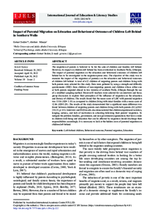The migration of parents is believed to be for the sake of children and families left behind. However, its impact on children left behind has been overlooked in Southern Wollo, Ethioipia. The impact of parental migration on the education and behavioral outcomes of children left behind has to be investigated in the migration-prone area. The objective of this study was to examine the impact of the migration of parent(s) on the education and behavioral outcomes of children left behind. A total of 622 children of migrating parents and children living with both parents were selected for this study. Data were gathered by using a strength and difficulty questionnaire (SDQ) from children of non-migrating parents and children whose either one or both parents migrated abroad in two weredas of southern Wollo, Ethiopia through the use of a stratified sampling method.
Morover, 18 teachers were selected for an interview and focus group discussion to explore their perception of the influence of migration on the education and literacy of children. The results found that the mean score of LBC with parental migration was 15.86 (SD= 3.18) as compared to children living with intact families with a mean score of 12.06 (SD=3.20).
The results of the study demonstrated that a significant mean difference was found between children of migrating parents and children living with both parents (F(1,620)= 219.25, p<.01). Interview and FGD results also demonstrated that children experienced isolation, longing, sadness, and lack of motivation in schooling following their parents’ migration. To mitigate the problem families, government, and non-government organizations that have a stake in children's well-being and education that can be affected by migration should discharge their responsibilities accordingly. It is necessary to look at the hidden costs of parental migration on children left behind.

